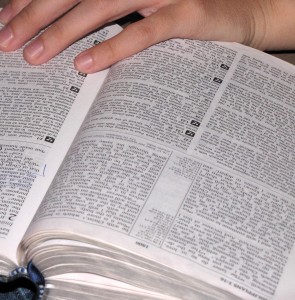To hear my blog post read aloud, just click the play button. If you’re reading this in an email, you may have to click here to hear the post on my site.
I keep coming back to the idea of trust these days.
It is difficult to trust God in so many different areas sometimes.
We sing songs that speak things like take my life and let it be all for You and for Your glory. In a song I recently played at church, Grateful, there is a line that says, Whatever comes I won’t complain.
Do I really mean that?
Will I truly tell God that He can have my life for His glory? Am I able to tell God that He can give me cancer, take away my sight, or, as it says in Job, “stretch out (His) hand and strike (my) flesh and bones” if doing so will bring Him glory?
Perhaps.
After all, this life is a mist that appears for a little while and then vanishes. Of what importance is my body compared to my or anyone else’s soul?
What about my family?
They are just as much a part of my life as my physical body. Am I able to tell God that He can have my family, do to them what He wills, even take them away from me if doing so will bring Him glory?
This is much harder.
Could I say with Job, The Lord gave and the Lord has taken away; may the name of the Lord be praised?
Frightening questions.
Yet why should I be afraid? Isn’t this the same God of Whom was said, “He will take great delight in you, He will quiet you with His love, He will rejoice over you with singing”? Isn’t this the same God Who “did not spare His own Son, but gave Him up for us all—how will He not also, along with Him, graciously give us all things?”
Yet it IS frightening. It is so difficult to truly and deeply trust God.
Yet one thing that I am learning is that when God gives commands, He also gives power.
Teresa of Avila, a sixteenth century Carmelite nun, writes of when the Lord appeared to His disciples after the resurrection and said to them, “Peace be with you.” and she writes,
It has occurred to me that this salutation of the Lord must mean much more than the words suggest, as must also His telling the glorious Magdalen to go in peace; for the words of the Lord are like acts wrought in us.
When God commands us to be Holy as He is holy, when He commands us to love Him with all of our heart, soul, mind, and strength, when He commands us to trust in Him with all our heart,
it is less a command than a promise.
Frederick Buechner puts it this way:
The final secret, I think, is this: that the words ‘You shall love the Lord your God’ become in the end less a command than a promise. And the promise is that, yes, on the weary feet of faith and the fragile wings of hope, we will come to love him at last as from the first he has loved us – loved us even in the wilderness, especially in the wilderness, because he has been in the wilderness with us. He has been in the wilderness for us.
Because at its heart the gospel is about God moving toward us, doing for us what we are incapable of doing on our own.
So trust God.
And when you can’t trust God, ask Him to carry you the rest of the way into the promise of that trust.
I think we will find that God has not only moved toward us but has lifted us up and carried us the rest of the way toward Himself, even in the middle of our fear and doubt.
Art Credits: Christ in the House of Martha and Mary by Henryk Siemiradzki; Santa Teresa de Jesus by Alonso del Arco; all other photographs are copyright Made Sacred 2018






